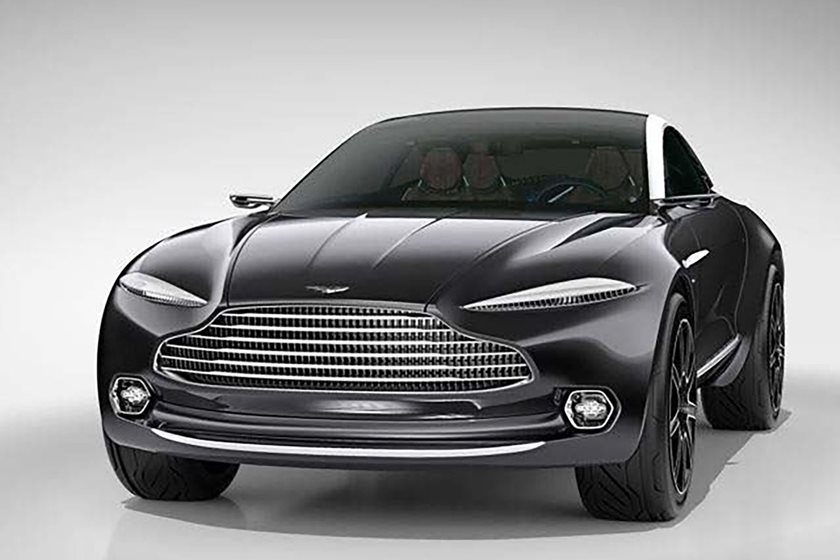An all-electric Aston Martin DBX crossover is no longer part of the plan.
Like other luxury automakers, Aston Martin will soon be adding an SUV to its lineup to meet consumer demands and ensure the company's long-term survival. The British automaker recently confirmed it will launch a fully electric crossover in 2021 under its new Lagonda luxury sub-brand. But don't forget the company is also working on its own SUV, which was previewed back in 2015 by the DBX Concept. Originally, Aston Martin was planning to offer a pure electric powertrain for the DBX.
![]()
While EVs are still being developed by the automaker, the DBX is no longer part of that plan. Instead, the production DBX will use conventional gasoline and hybrid powertrains, as confirmed by CEO Andy Palmer via Car and Driver. “We have the capability to do [an EV], but the plan right now is gasoline and hybridization,” he said. “What we originally showed was a DBX concept, and the new platform has indeed been delivered with the capability to have either gasoline or pure electric, but that [EV] technology gets used first on the Lagonda.” The first Lagonda model will reportedly be an all-electric SUV, so offering an Aston Martin-branded SUV alongside it would have likely caused confusion for consumers.
![]()
Aston Martin's technical partnership with Daimler means there’s a good chance the DBX’s gasoline and hybrid powertrains will use the same twin-turbocharged AMG V8 that powers the DB11, Vantage, and forthcoming DBS Superleggera. A plug-in hybrid system is expected to add around 200 horsepower to the V8. In the DB11, the V8 engine produces 503 hp, so in theory the DBX PHEV could have a combined output of around 700 hp. There’s no mention if the DBX will be offered with Aston Martin’s 600-hp, twin-turbo 5.2-liter V12, however. Palmer also confirmed that Aston Martin is planning to hybridize the V12 to ensure it meets increasingly tough emissions standards in markets like the US.
![]()
“We see a path that enables us to conform with CAFE regulations with its hybridization,” he said. Purists may prefer it to be naturally aspirated, but “a 12-cylinder is a 12-cylinder,” Palmer notes, adding that the V12 is the “beating heart of the company”.
![]()
![]()
![]()
![]()
Like other luxury automakers, Aston Martin will soon be adding an SUV to its lineup to meet consumer demands and ensure the company's long-term survival. The British automaker recently confirmed it will launch a fully electric crossover in 2021 under its new Lagonda luxury sub-brand. But don't forget the company is also working on its own SUV, which was previewed back in 2015 by the DBX Concept. Originally, Aston Martin was planning to offer a pure electric powertrain for the DBX.

While EVs are still being developed by the automaker, the DBX is no longer part of that plan. Instead, the production DBX will use conventional gasoline and hybrid powertrains, as confirmed by CEO Andy Palmer via Car and Driver. “We have the capability to do [an EV], but the plan right now is gasoline and hybridization,” he said. “What we originally showed was a DBX concept, and the new platform has indeed been delivered with the capability to have either gasoline or pure electric, but that [EV] technology gets used first on the Lagonda.” The first Lagonda model will reportedly be an all-electric SUV, so offering an Aston Martin-branded SUV alongside it would have likely caused confusion for consumers.

Aston Martin's technical partnership with Daimler means there’s a good chance the DBX’s gasoline and hybrid powertrains will use the same twin-turbocharged AMG V8 that powers the DB11, Vantage, and forthcoming DBS Superleggera. A plug-in hybrid system is expected to add around 200 horsepower to the V8. In the DB11, the V8 engine produces 503 hp, so in theory the DBX PHEV could have a combined output of around 700 hp. There’s no mention if the DBX will be offered with Aston Martin’s 600-hp, twin-turbo 5.2-liter V12, however. Palmer also confirmed that Aston Martin is planning to hybridize the V12 to ensure it meets increasingly tough emissions standards in markets like the US.

“We see a path that enables us to conform with CAFE regulations with its hybridization,” he said. Purists may prefer it to be naturally aspirated, but “a 12-cylinder is a 12-cylinder,” Palmer notes, adding that the V12 is the “beating heart of the company”.



